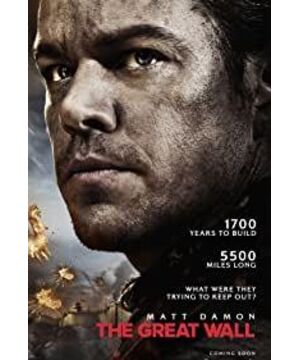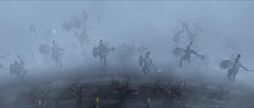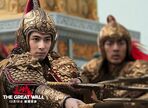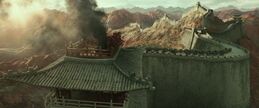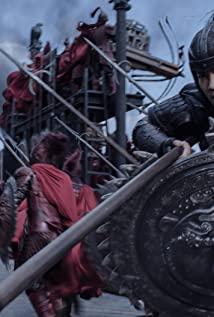I think what I need to ask is: why the Song Dynasty? Why the Great Wall? Why is the northern gluttonous? Why is the 10-year cycle harassment? Why the ban? Why weapons? Why are there foreigners and must obey Chinese laws? Because the selection of these elements and the setting of the plot are very meaningful (rather than trivial embellishments and decorations) not only alluding to historical facts, but also of typical significance in revealing the cultural psychology of Zhang Yimou and even contemporary Chinese people. Therefore, The Great Wall can be described as an allegorical text in contemporary China.
First, why did you choose the Song Dynasty? On the one hand, it has experienced the famous "Tang and Song Dynasties", and the Song Dynasty is regarded as the pinnacle of Chinese culture. On the other hand, the Song Dynasty is an era of constant internal and external troubles. In the past, continuous setbacks, especially the invasion of foreign enemies, finally ruined the dynasty. Therefore, Zhang Yimou's choice of this two-sided era shows an extraordinary profound meaning.
Second, "Defending the Great Wall" in the movie has its symbolic historical background. Later Jin "Emperor" Shi Jingtang ceded the sixteen prefectures of Yanyun (also known as "Sixteen Prefectures of Youyun") to Khitan, which are now located in Beijing, Tianjin, Shanxi, and northern Hebei, which is also along the Great Wall set in the movie. Song Taizong Zhao Guangyi, after completing the unification of the southern border and the annihilation of the Northern Han Dynasty, ended the split of the Five Dynasties and Ten Kingdoms, he immediately commanded the northern expedition to Khitan twice, trying to recover the old land of Yanyun, but he was defeated, and the strategy changed from offensive to defensive. In the Southern Song Dynasty, although there were many northern expeditions in the early stage (even Luoyang was once recovered), but in the end, they only defended along the Yangtze River. The Great Wall (including the Yangtze River) has also become a lifeline related to the survival of the country. Therefore, guarding the Great Wall symbolizes the national complex of the ever-changing Northern Expedition and the restoration of the land during the Song Dynasty, and also shows that the Song Dynasty emphasized the importance of literature over martial arts and military affairs. Some kind of historical tragedy of decline.
Defending the Great Wall and "advancing under enemy fire" reflects the keynote of modern Chinese history: "Saving the Nation", which symbolizes China's sense of national distress and territorial complex arising from the invasion and humiliation of foreign powers since the Opium War. It is conceivable that the passionate slogan resounded in Zhang Yimou's heart: "Salvation overwhelms enlightenment".
Third, gluttonous food is nothing more than an exaggerated representation of the barbarians such as the Liao, Jin, and Mongolia in the Song Dynasty compared with the Zhengshuo of China, and the nightmare of the northern invasion is not only the collective unconsciousness of the past dynasties in China (the great achievements in the south, the great achievements in the north, the expedition in the north) Many broken halberds), and Yin Jian is not far away, isn’t the Soviet Union, which was under pressure, the northern gluttony that was eyeing China in the 1960s? And now facing the polar bears with the deepest and most greedy desire for land, led by strongmen, aren't we equally uneasy? And, more importantly, doesn't the Soviet Union/Russia also have a gluttonous mother who commands the three armies and dominates everything? As Freud said, the return of the repressed will bring extraordinary terror. I think this kind of northern nightmare is definitely not the voice of Zhang Yimou alone, right?
Fourth, the intrusion once every ten years was also the daily state of national defense in the Song Dynasty. Although Song has signed a series of peace treaties with its northern neighbors since the Tanyuan Alliance, and even promised a heavy annual tribute, it is still impossible to prevent the party from tearing up the treaty (of course, Song himself also tore up the treaty, but almost all of them are self-defeating. , tragic ending, such as attacking Liao with Jin, and eventually the Northern Song Dynasty perished; helping Mongolia to destroy Jin, and finally the Southern Song Dynasty destroyed the country). Here, Zhang Yimou revealed a strong sense of distrust of the international political system and related international treaties, as well as extremely realistic political concepts. From the Westphalian system, the Vienna system, the Versailles-Washington system, and even the Yalta system, international politics has always been a tool of power. The latter three directly led to China becoming a sword, and the deep suffering imposed by various unequal treaties further It confirms the truth that weak countries have no diplomacy. The tragic fate of the Song Dynasty is undoubtedly a vivid example.
Fifth, the Song Dynasty imperial army (rather than the local frontier guards) stationed on the frontier in the film is unusually powerful. This setting is actually very consistent with the historical situation. Since the An-Shi Rebellion, China has been divided into local divisions (the vassal towns in the Tang Dynasty, and then the Five Dynasties and Ten Kingdoms). Therefore, the monarchs of the Five Dynasties and Ten Kingdoms attached great importance to the status of the central army, that is, the forbidden army. Son, and so on, strengthen the forbidden army. Zhao Kuangyin, as the commander of the Imperial Army of the Later Zhou Dynasty, and Huang Paojia behind him, took a cup of wine to release the military power, nothing more than to avoid repeating the same mistakes and deliberately eliminate local forces. Subsequent construction of the Forbidden Army, such as "separating the soldiers", transferring elite soldiers into the Forbidden Army, and garrisoning in various places of the Forbidden Army, also followed this thinking, and it has really eliminated the central government's confidant since the mid-Tang Dynasty (BTW Yue Jiajun). 's tragic fate is also related to this). What Zhang Yimou expresses here is the belief in national unity that has penetrated deep into the hearts of the Chinese people after a series of painful lessons such as the Taiping Rebellion, the melee of warlords in the Republic of China, and the civil war between the Kuomintang and the Communist Party. A unified modern China is the supreme pursuit of Zhang Yimou.
Sixth, the dizzying and powerful weapons in the movie, although exaggerated, are indeed in line with the high level of weapons in the Song Dynasty. Despite the emphasis on literature over martial arts, due to the serious threats from the northern countries (Liao, Jin, Xixia, Mongolia), the Song Dynasty became the dynasty that paid the most attention to the development of weapons in China. When Europe in the Middle Ages was still fighting with cold weapons, the Song Dynasty had already begun to use hot weapons. Zhang Yimou's exaggerated description of weapons is not only a tribute to the military development of the Song Dynasty, but also out of a deep-rooted ideological belief: "Being behind will be beaten." Yan Fu's translation of "Evolution of the Sky" propagated "natural selection, survival of the fittest", which aroused the Chinese people's sense of crisis, and social Darwinism penetrated deep into the heart and became an unbreakable truth. Therefore, facing the strong ship of foreign powers Li Pao must be transformed into a military power in order to resist foreign invaders.
Seventh, why are there foreigners? And must abide by Chinese law? In the Song Dynasty, it was quite common for foreigners to live in China. The pressure of redundant officials and excessive expenses prompted the Song Dynasty to attach importance to trade (of course, there were also political considerations for connecting allies), and overseas trade was extremely prosperous, which could be called a golden age. This kind of openness is by no means inferior to that of the Tang Dynasty, which has attracted a large number of foreigners to China, including businessmen from the Middle East and Buddhist monks from Japan. Moreover, the Song Dynasty established the Shi Ship Division to govern overseas trade and safeguard its own sovereignty. This is a far cry from the semi-colonial situation in which China has lost its sovereignty and foreigners have extraterritorial rights since the Opium War. Opening up based on sovereignty, isn't this the ideal that contemporary China is tirelessly dreaming of?
A unified, strong, open and modern China with a long history and splendid civilization, I think, this is the ideal that Zhang Yimou is trying to convey, and it is also the typical cultural psychology and historical thinking of contemporary China. As for artistically, whether this effort to convey is really successful, I, who haven't seen the movie, have no say.
Finish
View more about The Great Wall reviews


